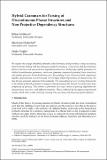Hybrid grammars for parsing of discontinuous phrase structures and non-projective dependency structures
Date
09/2017Metadata
Show full item recordAbstract
We explore the concept of hybrid grammars, which formalize and generalize a range of existing frameworks for dealing with discontinuous syntactic structures. Covered are both discontinuous phrase structures and non-projective dependency structures. Technically, hybrid grammars are related to synchronous grammars, where one grammar component generates linear structures and another generates hierarchical structures. By coupling lexical elements of both components together, discontinuous structures result. Several types of hybrid grammars are characterized. We also discuss grammar induction from treebanks. The main advantage over existing frameworks is the ability of hybrid grammars to separate discontinuity of the desired structures from time complexity of parsing. This permits exploration of a large variety of parsing algorithms for discontinuous structures, with different properties. This is confirmed by the reported experimental results, which show a wide variety of running time, accuracy and frequency of parse failures.
Citation
Gebhardt , K , Nederhof , M J & Vogler , H 2017 , ' Hybrid grammars for parsing of discontinuous phrase structures and non-projective dependency structures ' , Computational Linguistics , vol. 43 , no. 3 , pp. 465-520 . https://doi.org/10.1162/COLI_a_00291
Publication
Computational Linguistics
Status
Peer reviewed
ISSN
0891-2017Type
Journal article
Collections
Items in the St Andrews Research Repository are protected by copyright, with all rights reserved, unless otherwise indicated.

